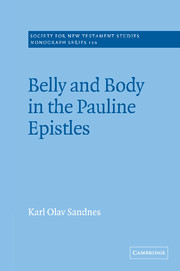Book contents
- Frontmatter
- Contents
- Preface
- Abbreviations
- Part 1 Prolegomena
- Part 2 The Graeco-Roman belly
- 2 The belly as a sign – ancient physiognomics
- 3 The belly in ancient moral philosophy
- 4 Ancient critique of Epicureanism
- 5 Banquets – opportunities for the belly
- Part 3 The appropriated belly
- Part 4 Belly-worship and body according to Paul
- Part 5 The earliest expositors of Paul
- Part 6 Conclusions
- Bibliography
- Index of modern authors
- Index of Graeco-Roman sources
- Index of Old Testament, Apocrypha, Pseudepigrapha and other Jewish writings
- Index of New Testament and early Christian writings
5 - Banquets – opportunities for the belly
Published online by Cambridge University Press: 22 September 2009
- Frontmatter
- Contents
- Preface
- Abbreviations
- Part 1 Prolegomena
- Part 2 The Graeco-Roman belly
- 2 The belly as a sign – ancient physiognomics
- 3 The belly in ancient moral philosophy
- 4 Ancient critique of Epicureanism
- 5 Banquets – opportunities for the belly
- Part 3 The appropriated belly
- Part 4 Belly-worship and body according to Paul
- Part 5 The earliest expositors of Paul
- Part 6 Conclusions
- Bibliography
- Index of modern authors
- Index of Graeco-Roman sources
- Index of Old Testament, Apocrypha, Pseudepigrapha and other Jewish writings
- Index of New Testament and early Christian writings
Summary
Introduction
We have seen that mastery of the stomach and the critique launched against Epicureans and belly-devotion were not words plucked out of thin air. From the perspective of the critics, those who participated in lavish and indulgent banquets were hooked on eating, drinking, and sex. The banquets were often seen as nurseries of the pleasures. When we come to Philo in the next chapter, this nexus between banquets and the pleasures of the stomach becomes even more explicit. His warnings against being enslaved by the belly have a clear reference to extravagant pagan meals and the lifestyle which accompanied them (e.g. Contempl. 48–56). It is the aim of this chapter to demonstrate that the lifestyle associated with the belly-topos concurs with the agenda of symposia. In other words, we are searching for a historical point of departure for the belly-rhetoric.
This is not to say that all banquets followed the pattern outlined below, but this agenda is so widely attested that it is worth noting. Furthermore, I do not claim that Epicurean philosophy and banquets can be subsumed under the same heading, but the critics of antiquity made this nexus in their polemic. The authenticity of this polemic might, of course, be disputed. Moral philosophers may well exaggerate according to their aim of fighting what they considered to be flagrantly hedonistic parties.
- Type
- Chapter
- Information
- Belly and Body in the Pauline Epistles , pp. 79 - 94Publisher: Cambridge University PressPrint publication year: 2002



